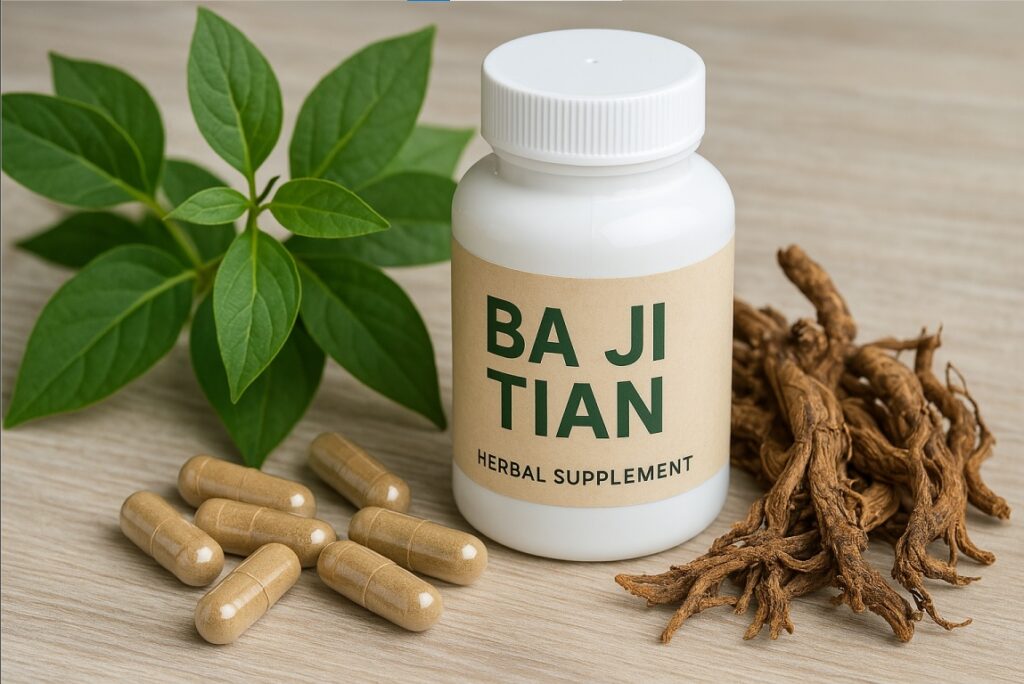POPULAR NAME(S) WORLDWIDE
- Scientific Name: Morinda officinalis.
- Common names in English: Ba ji, Bi ji, Bajitian, Cheqianzi, Noni (Morinda citrifolia).
- Alternative spellings and Variants: Indian Mulberry, Radix Morindae Officinalis, Morindae Radix, Racine du Morinda.
OVERVIEW
Ba Ji Tian (Morinda officinalis) is a herb that grows in tropical regions, particularly in China, India, and Southeast Asia. It has been used in traditional medicine for centuries, especially in Chinese medicine. The name “Bajitian” comes from Chinese, where “Ba Ji” means “eight extremes,” referring to the herb’s ability to balance strength and energy, and “Tian” means “heaven” or “sky,” symbolising its powerful, rejuvenating qualities. The root of the plant is used for medicinal purposes, typically in the form of powder or extract for supplements. You can learn complete details about Ba Ji Tian in the USA from Clear Mind Haven.
Bajitian health benefits are generally safe when used correctly, but like any herbal supplement, it is important to use it carefully. It is recommended to consult a doctor before using Bajitian if there are health conditions, particularly related to the kidneys or liver, if taking other medications, or if pregnant or breastfeeding.
Bajitian improves kidney health by strengthening the kidneys and boosting overall energy. It also addresses male sexual health by helping with low libido, erectile dysfunction, and other sexual health issues. Additionally, Bajitian increases energy levels, reduces fatigue, and enhances stamina and vitality.
USES AND HEALTH BENEFITS OF Ba Ji Tian
- Ba Ji Tian boosts energy and stamina.
- It enhances sexual health and libido (Sexual appetite), especially in men like Ashwagandha. Because Ashwagandha is also renowned for boosting male vitality.
- It supports bone strength and helps reduce fatigue, like Bacopa.
- It promotes overall vitality and increases energy levels.
- It treats symptoms of coldness in the body, helping people who feel weak or tired.
- It supports kidney health and improves kidney function, similar to Astragalus.
- It increases muscle strength and supports physical performance.
SIDE EFFECTS
While Ba Ji Tian’s health benefits are well-documented, this herb is generally considered safe when used appropriately for short periods. However, like all herbal supplements, it may cause some side effects in certain individuals.
Common or Mild Side Effects: It may cause mild stomach issues like bloating or nausea. Some people experience a dry mouth or feel unusually thirsty. High doses can lead to restlessness or irritability. Mild dizziness may also occur.
Less Common but Possible: Sometimes, it may increase body heat or cause sweating because it is a “yang-tonifying” herb. This means that it boosts energy and warmth in the body. This can sometimes overstimulate the body, leading to headaches.
Rare or Potential Allergic Reactions: Allergic reactions are rare but possible. These may include skin rashes, itching, or swelling of the lips or face. When you notice these effects, get medical advice right away.
Related: Everything You Need to Know Before Using Herbal Supplements.
INTERACTIONS
Ba Ji Tian Interacts with Blood-Thinning Medications
It may increase the risk of bleeding when taken with blood-thinning medications like warfarin. The herb can act as a mild anticoagulant, which, when combined with blood thinners, may result in excessive bleeding.
Ba Ji Tian Interacts with Other Energy-Boosting Herbs
It boosts energy levels, and when combined with other herbs like ginseng or rhodiola, it may overstimulate the body. This can lead to symptoms like nervousness, restlessness, or insomnia.
Ba Ji Tian Affects Blood Pressure Medications
It can interfere with blood pressure medications. It may increase body heat and cause sweating, which could disrupt blood pressure regulation. This might lead to unstable blood pressure levels in people already on blood pressure-lowering drugs.
Ba Ji Tian Impacts Hormone-Related Medications
It can influence hormone levels similar to Abuta. It may interfere with medications used for hormone-sensitive conditions like breast cancer or prostate cancer. People on these medications should consult a healthcare provider before using them.
Ba Ji Tian Enhances the Effects of Stimulants
It may increase the effects of stimulants like caffeine or ephedrine, leading to increased heart rate, nervousness, or anxiety. People taking stimulants should use caution when combining them with Ba Ji Tian.
Related: How to Use Medicines Safely.
DOSAGE
Ba Ji Tian is available in different forms, including capsules, extracts, powders, and teas. The dosage depends on the form you’re using and the purpose for which you are taking it. Here are some common ways to take it:
ORAL USE (BY MOUTH)
- Capsules or Tablets: The typical dosage is around 500 mg to 1 gram per day, taken in divided doses. You should follow the instructions on the product or as recommended by your healthcare provider.
- Extracts or Tinctures: If you’re using an extract, the usual dosage is about 5-10 drops taken 2-3 times a day. Always look for detailed instructions on the label.
- Powder Form: The powdered form can be mixed with water or juice. A common dosage is about 1 to 2 grams per day.
- Herbal Tea: Ba Ji Tian can also be brewed as a tea. Typically, you would use 1-2 grams of dried Ba Ji Tian root per cup of hot water. Drink it once or twice daily.
BA JI TIAN HEALTH BENEFITS WHEN APPLIED TOPICAL:
Ba Ji Tian is rarely applied topically for skin issues, but if used, it is typically in the form of a cream or ointment. The dosage for topical use depends on the product. It’s important to follow the instructions on the label for proper application.
- Muscle and Joint Pain Relief: Ba Ji Tian is sometimes included in topical balms or creams for its anti-inflammatory and pain-relieving properties. While Arnica is popular for topical pain relief, Ba Ji Tian also helps ease muscle soreness or joint pain when applied directly to the skin.
- Improving Blood Circulation: When applied topically, Ba Ji Tian may help stimulate blood flow, which can support healing and reduce discomfort from conditions like cold extremities or poor circulation.
- Promoting Skin Health: Although not commonly used for this, Ba Ji Tian is sometimes included in skin creams for its energizing properties. It may help with fatigue or stressed skin, especially in products aimed at promoting overall vitality and health.
SPECIAL PRECAUTIONS AND WARNINGS
- Pregnancy and Breastfeeding: Avoid using Ba Ji Tian during pregnancy or breastfeeding unless directed by a healthcare provider. The safety of Ba Ji Tian during these periods has not been established.
- Hormonal Conditions: It may affect hormone levels. If you have conditions like breast cancer, prostate cancer, or endometriosis, consult your doctor before using it.
- Existing Medical Conditions: If you have conditions like high blood pressure, kidney disease, or heart problems, seek medical advice before using Ba Ji Tian to avoid complications with your current treatment.
- Medication Interactions: It can interact with medications, especially blood thinners, hormonal therapies, and stimulants. Always check for possible interactions if you are taking other medications.
- Allergic Reactions: Some people may be more sensitive to Ba Ji Tian. If you have a history of allergies to herbs or plants, use it with caution and monitor for reactions such as rashes or swelling.
1. Zhang L, Zhao X, Wang F, et al. Effects of Morinda officinalis Polysaccharide on Experimental Varicocele Rats. Evid Based Complement Alternat Med. 2016;2016:5365291. View abstract.
2. Chen DL, Zhang P, Lin L, et al. Protective effects of Morinda officinalis polysaccharide on lipopolysaccharide-induced acute lung injury in mice. J Ethnopharmacol. 2014;158(Pt A):439-445. View abstract.
3. Li YL, Liang FY, Jiang W, et al. HS-SPME-GC-MS analysis of volatile components in Morinda officinalis from different regions. Chin J Nat Med. 2017;15(8):614-622. View abstract.
4. Wang M, Meng D, Zhang P, et al. Antioxidant activity of Morinda officinalis How. and its protective effects against oxidative damage in vitro. Food Funct. 2015;6(3):860-866. View abstract.
5. National Pharmacopoeia Committee. Pharmacopoeia of the People's Republic of China. Beijing: China Medical Science Press; 2020: Morinda officinalis monograph. View abstract.
6. Yang X, Huang S, Chen J, et al. Evaluation of the anti-fatigue effects of Morinda officinalis in mice. Afr J Tradit Complement Altern Med. 2017;14(3):1-8. View abstract.
7. Liu Z, Li X, Simoneau AR, et al. Morinda officinalis How. - A comprehensive review of traditional uses, phytochemistry and pharmacology. J Ethnopharmacol. 2018;213:230-255. View abstract.
8. World Health Organization. WHO Monographs on Selected Medicinal Plants - Volume 4. Geneva: WHO Press; 2009: Morinda species profile. View abstract.
9. Li N, Qin LP, Han T, et al. Inhibitory effects of Morinda officinalis extract on bone loss in ovariectomized rats. Molecules. 2009;14(6):2049-2061. View abstract.
10. Chinese Herbal Medicine Editorial Board. Encyclopedia of Chinese Materia Medica. Shanghai: Shanghai Science and Technology Press; 2006: Morinda officinalis entry. View abstract.
Want to Read More?
- Read more about [The Best Vitamins for Kids and Teens Do they Need Supplements?]
- Stay connected with us, Click here

